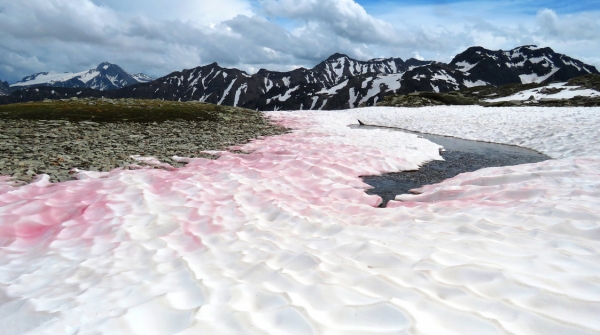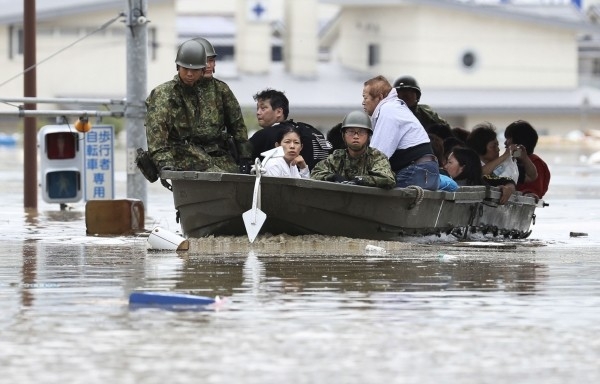Korea has struggled due to the heavy rain for weeks. However, Korea is not the only country suffering from climate change. Let us see what is happening on this earth with ST! ....................Ed
NOAA (The U.S. National Oceanic and Atmospheric Administration) predicted that the earth’s temperature has been in the top five since the beginning of the 1880 observation. From January to May this year, the average global temperature rose 1.1 degrees from the average of 13.1 degrees Celsius in the 20th century. It was the second highest since the observation. In particular, the average global temperature rose 0.95 degrees in May from the average year, tied with May 2016 when it was recorded as ‘the hottest May ever.’
Global warming is the cause of the rapid rise in global temperatures. As global warming continues, abnormal weather conditions have recently emerged in many parts of the world. I would like to introduce three cases that have led to this major issue recently.
1. Fires in Siberia
Known as the coldest region in the world, Siberia is suffering from heat waves. More than 300 forest fires have occurred in Siberia this year. The burned

forest is more than 1,400 square kilometers. This is mostly natural fires. The cause of the fire is abnormally high temperatures in Siberia. In June this year, temperatures in Siberia soared to 38 degrees Celsius. In some areas, the temperature of the surface has increased by more than 10 degrees on average. This eventually made the frozen land vulnerable to fire as it melted and dried up again and again. As the fire continued, as much as 59 million tons of carbon dioxide were emitted during the month of June in Siberia. Moreover, the permafrost is melting, releasing huge amounts of greenhouse gases trapped in the ice. Even the pipeline buried underground began to crack. Oil leaking from the pipeline is further threatening Siberia’s environment.
Researchers from different countries studied the climate of Siberia from January to June this year. They found that the recent sweltering heat is expected to occur once every 80,000 years. Also, they concluded that without greenhouse gases, Siberia’s temperatures would have been at least 2 degrees lower this year. Thus, Siberia’s sizzling hot weather was mostly the fault of humans.
2. Pink Glaciers in the Italian Alps

Recently, the snow turned pink on the Presena glacier connected to the Alps in northern Italy. Scientists have estimated that this phenomenon has to do with the expansion of algae. Algae are a lower class of plants that live underwater and live independently with assimilated pigments. Generally, glaciers reflect 80 percent of the radiant heat coming from the sun. However, if the algae cover the top of the glacier and turn dark, more radiant heat is absorbed and the glacier melts faster. The reason for the spread of algae that have a negative impact on the environment is likely to be human activities, such as hiking or ski lifts.

This is not the first time the Alpine glacier has been in crisis. Last year, the glacier in Mont Blanc, the highest peak in Western Europe, was on the verge of collapse. Swiss authorities have started building precision radar systems and observing glacier movements. Furthermore, the 250,000-square-meter glacier covering Grandes Jorasses Peak could collapse. So, they recently closed all surrounding roads and hiking trails under the glaciers. Due to global warming, about 500 of the glaciers in the Swiss Alps disappeared in the 20th century until last year.
3. Heavy Rain in Japan

In July 2020, there was a record downpour in Kyushu, Japan. The strong rain clouds were formed in Kumamoto due to the influence of the monsoon front, causing heavy rain of up to 110 millimeters per hour. As a result, many roads were cut off on the weakened ground, and more than 70 people died in a series of river floods and landslides. The heavy rain that hit Japan caused damage to certain areas as it continued to bring in thin and long belt-shaped monsoonal front. The Japanese government has designated the heavy rain as a ‘specific emergency disaster’ and came up with economic measures worth about 4 trillion won. Two years ago, in Japan, typhoons accompanying heavy rains caused the worst damage, killing more than 220 people. In 2017, heavy rains in northern Kyushu killed more than 40 people and caused flooding and landslides. Such repeated damage almost every year is related to global warming. Due to global warming, the temperature changes and warm steam increases in the atmosphere, leading to abnormal downpours. So far, most of the damage has been caused by typhoons since August, but climate change could cause heavy rain damage from July. Without the solution for global warming, serious rain damage will be expected every year.

The largest causes of the three abnormal climate cases mentioned above are deepening global warming caused by humans. Most people might think, ‘What’s the difference if I try?’ But if our small efforts come together, such as the butterfly effect in which seemingly minor behaviors could lead to destructive typhoons, we could slow down global warming. We should practice reducing plastic use, which can be easily done in real life and maintain proper indoor temperature. Global warming is no longer a polar bear’s job. It is our job to live on Earth.
Oh Joo-eun (ST Cub-Reporter)
jjoo0331@soongsil.ac.kr


